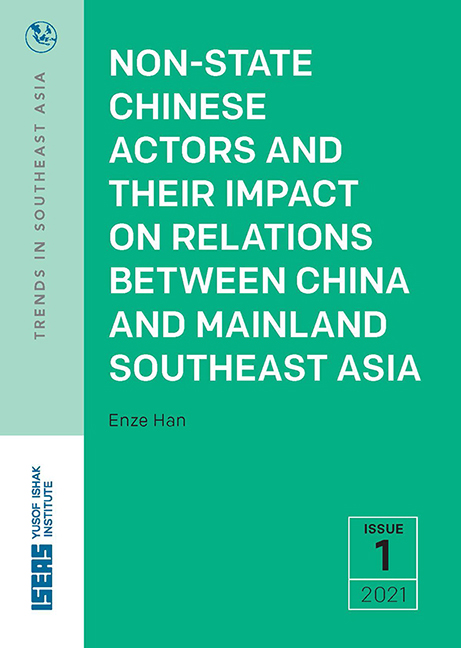
- Publisher:
- ISEAS–Yusof Ishak Institute
- Online publication date:
- December 2021
- Print publication year:
- 2020
- Online ISBN:
- 9789814951340
- Subjects:
- Sociology: General Interest, Sociology

International relations scholarship and the popular media tend to portray China as a great power with hegemonic designs for Southeast Asia. Moreover, studies on Chinese influence in Southeast Asia predominantly focus on the Chinese state. This paper argues that Chinese non-state actors and their daily encounters with local communities in Southeast Asia deserve equal attention as these interactions evidently produce friction at both the society-to-state and state-to-state level. The influence of Chinese non-state actors in Southeast Asia can be illustrated with three examples, namely, Chinese tourism operations in Thailand, Chinese market demand and agricultural transformations in Myanmar, and Chinese gangs within the casino economy in Cambodia. Thailand has recently become a top tourist destination for Chinese nationals. This has cultural implications as those involved in the tourism industry need to have Chinese language skills. The economic implications include increased competition and decreased accountability as Chinese tour companies have set up in Thailand using Thai locals as nominees. Bilateral relations also soured after a boat carrying Chinese tourists capsized in Thailand. As global prices of corn rose in 2011 and 2012, areas in Myanmar close to the Chinese border have increased corn cultivation to meet Chinese demands for that crop. This has led to deforestation in these areas. Chinese gangsters fleeing their government's crackdown in China have settled down to operate in the casino economy in Cambodia. Consequentially, there has been a rise in crime rate involving online scams and deteriorating public security. Despite the Chinese government encouraging the Cambodian government to enforce a ban on online gambling, the actions of non-state actors from China continue to be associated with the Chinese state as a whole and there is rising resentment towards the Chinese in Cambodia. The COVID-19 pandemic has temporarily halted cross-border trade between China and mainland Southeast Asia. This has negatively affected local farmers who are dependent on the Chinese market.
 Loading metrics...
Loading metrics...
* Views captured on Cambridge Core between #date#. This data will be updated every 24 hours.
Usage data cannot currently be displayed.